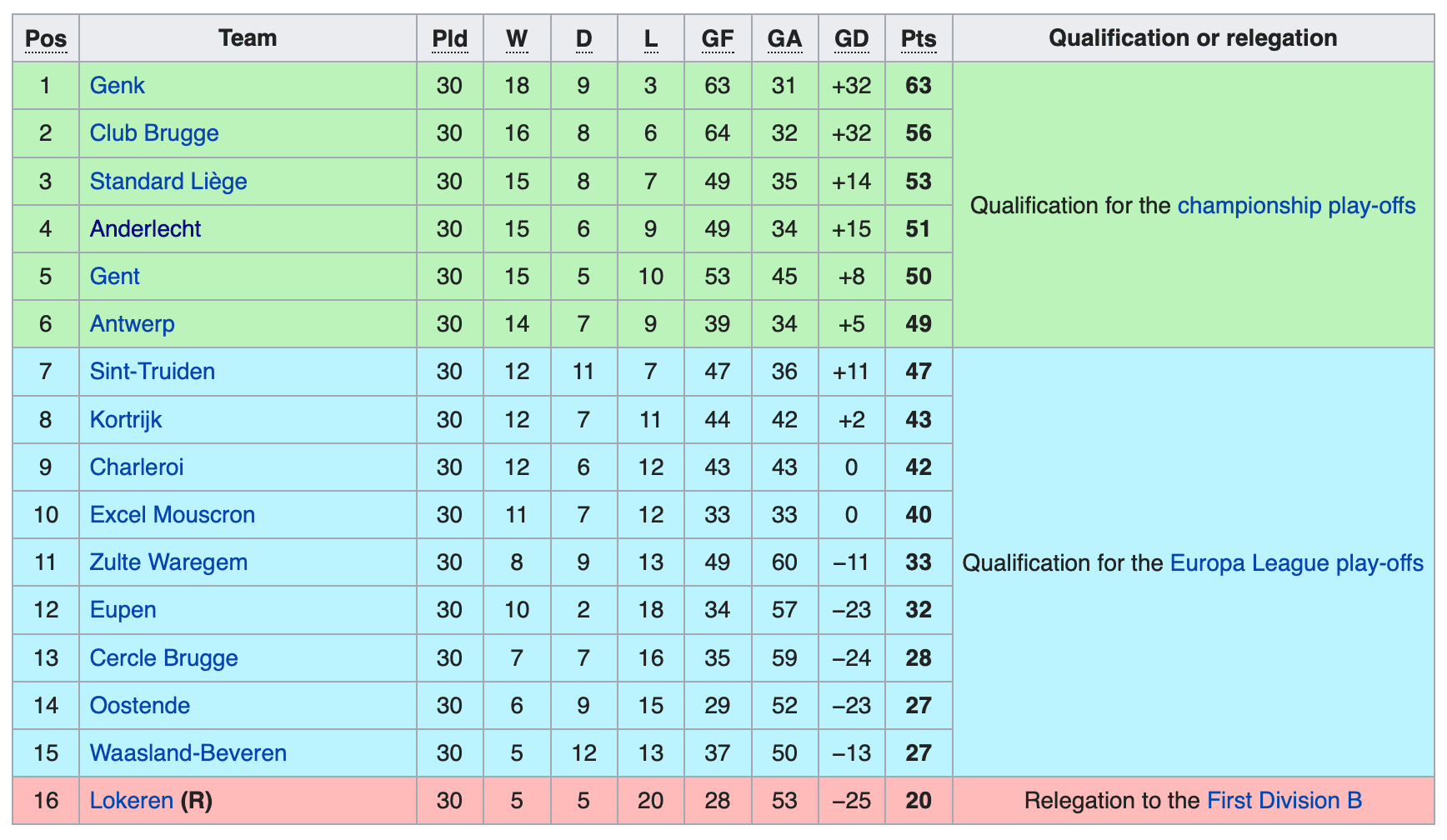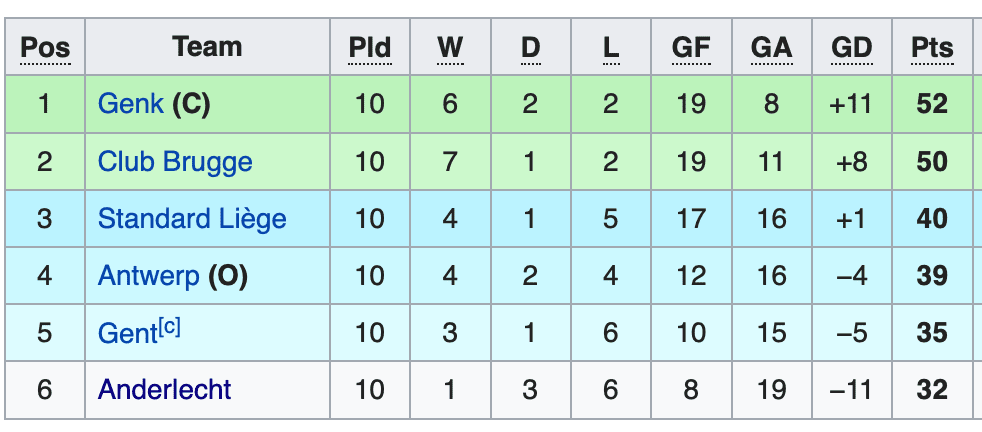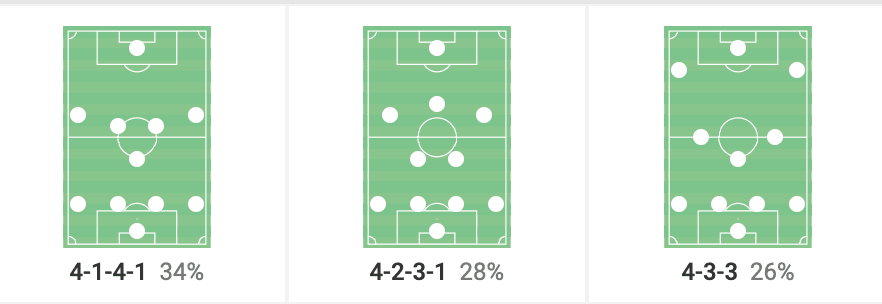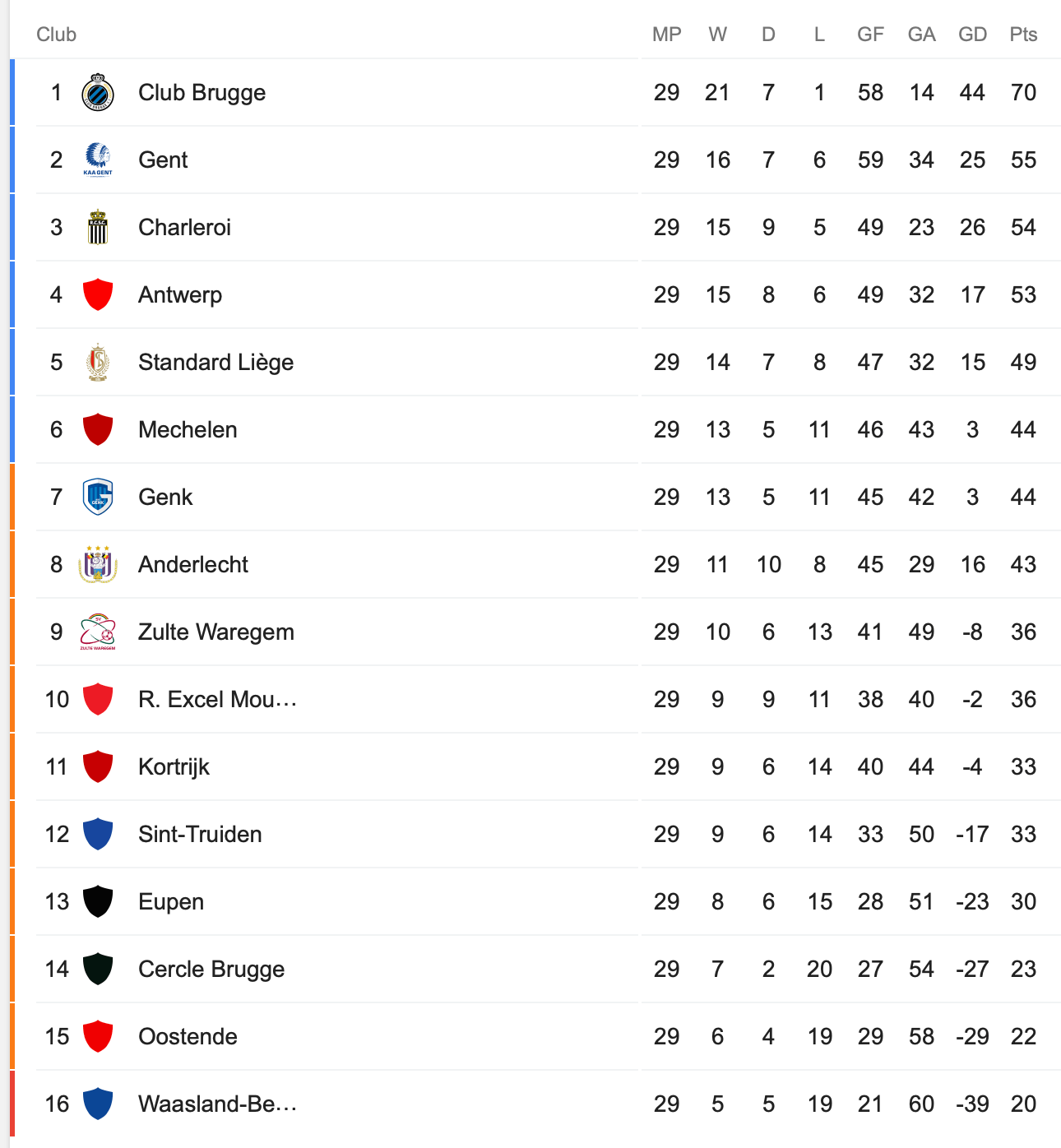In the summer of 2019, Vincent Kompany left Manchester City and the EPL after being at the club for 11 years and captaining the side to many major honours. He left to start his managerial career. The club in need of a new leader was his boyhood club Anderlecht, from where Kompany graduated from the academy and played for the first team before pursuing a playing career around Europe, including the Premier League and the 2. Bundesliga. The added interest when looking at Kompany’s managerial position at Anderlecht was the fact that he was up taking a player-manager role, a role often criticised within modern football.
This data analysis will investigate Kompany’s time at Anderlecht so far. The piece will perform an initial analysis of Anderlecht’s 2018/19 season, Kompany’s philosophy influencers, tactics, the player-manager dynamic and an appraisal of performances thus far in the season.
Anderlecht in 2018/19
Anderlecht are historically the most successful team in Belgium, holding the record for the most First Division A titles. In the 2018/19 season, Anderlecht finished the regular season period in fourth position. Whilst fourth does not seem to be a disaster by wider footballing contexts, for Anderlecht, as stated, they believe they should be winning or at least competing for the title every year. When finishing fourth, Anderlecht were 12 points behind the leaders Genk. However, during the championship period, Anderlecht’s performances and results fell lower than fourth. They won one of 10 matches, drawing three and losing six.


Overall, the poor results, combined with the less than successful change of ownership and multiple managers, Anderlecht sought a change that would take them back to their roots. Vincent Kompany, Anderlecht academy graduate, was the choice to revive the Anderlecht DNA and add some stability to the club with a three-year contract provided. With Kompany 33 years old, the decision was made for him to take the role as a player-manager, leading by example on and off the pitch, should his injuries allow.
| Goals Scored | xG | Goal Conceded | xGA | Shots For | Shots Against |
| 1.63 | 1.67 | 1.13 | 1.15 | 13.8 | 10.46 |
| Possession | Average Pass Length | Crosses | PPDA | Points per game |
| 59.73 | 20 | 17.86 | 6.83 | 1.7 |
The above statistics are averages per game for the regular season period in 2018/19. The championship period has been excluded due to the team qualify within the championship period, added to the fact that comparisons will be made to the 2019/20 regular season period.
Kompany’s systems of play
Vincent Kompany has had a multitude of tactical influences over the years, mainly from his time at Manchester City. Roberto Mancini played a defensively solid 4-2-3-1 formation, Manuel Pellegrini utilised a narrow 4-4-2 with wide playmakers whilst Pep Guardiola played a fluid 4-3-3 with a multitude of tactical fluidness. All influencers held a possession-based approach and a positive, front foot attitude with the ball.
Overall, Kompany has utilised 4-1-4-1, 4-3-3 and 4-2-3-1 formations throughout the season to try and find an optimal setup. Of course, such formations are only guidelines to unit set up, with average positions and responsibilities differing in each system and each match. The piece will now explain the effectiveness of systems throughout different periods of the season.

The start of the season
Anderlecht had a poor start the 2019/20 season, picking up just six points from the first nine matches. Of course, there was always going to be a settling in period as Kompany adapted to the players and the players adapted to his method and philosophy. However, even with the transition period, Anderlecht were expected to win matches due to superior playing personnel when compared to other teams, boosted by the addition of new signings including Kemar Roofe, Samir Nasri, Nacer Chadli, Michel Vlap, Landry Dimata and Philippe Sadler. Although it could be argued that these additions extended the familiarisation period. In addition, this was the clubs worst start since 1998/99. Things looked bleak and while the club said it would take time, results needed to change. Anderlecht were positioned 13th out of 16 teams in the league.
Within those first nine matches, Kompany utilised a 4-1-4-1 in the majority of matches, which turned into a 4-3-3 when attacking. A 4-3-3 was also adopted from the start of some matches.
| Goals Scored | xG | Goals Conceded | xGa | Shots For | Shots Against | |
| 18/19 | 1.63 | 1.67 | 1.13 | 1.15 | 13.8 | 10.46 |
| 19/20 (9 matches) | 0.66 | 1.28 | 1.22 | 1.57 | 12.11 | 11.55 |
| Possession | Average Pass Length | Crosses | PPDA | Points per game | |
| 18/19 | 59.73 | 20 | 17.86 | 6.83 | 1.7 |
| 19/20 (9 matches) | 61 | 19.69 | 15.55 | 7.81 | 0.77 |
The tables highlight average match data comparison the regular season averages for 2018/19 with the opening nine matches of 2019/20.
The data comparison above highlights the poor Anderlecht start. Yes, the data for 19/20 only includes the opening nine matches, which is likely to bring sample size effects. However, the differences, from an already poor 18/19 season are clear. In 19/20, Anderlecht were scoring fewer goals, expecting fewer goals, conceding more and expecting to concede more. A potential positive within the 19/20 stats is the underperformance in terms of xG, suggesting that an increase in the goal rate should arrive, however, the overall xG was still lower than 18/19.
Kompany’s team took fewer shots and conceded more per game. In terms of playing style, it appears that by intention or design, Kompany’s teams experience more possession. The passing style of the teams is virtually same but the pressing intensity has decreased. A playing style difference seems to occur in terms of the number of crosses utilised. Overall though, Kompany’s initial start to the season was far less effective in terms of points per game in comparison to the 18/19 season averages.
Adaptations to the player-manager role
For the first four matches of the nine-game period analysed above, Kompany was playing on the pitch and focussing on substitutions and tactical tweaks needed. This is one of the downfalls of being a player-manager. It is difficult to focus on both playing and the overall tactical picture at the same time. Added to this, the benefits, information and vantage points which the manager can gain through performance analysts on the sideline. Because of this, it was decided that Kompany would step back from managerial duties involving tactics and substitutions on a matchday, leaving Simon Davies in charge. Given the analysis above, albeit from a small sample, this did not change performances.
Additional changes
Kompany and Davies continued to tweak the starting line-up, with Kompany missing multiple matches due to injury. They trialled a 4-2-3-1 in week 11 and ran out 4-1 winners against Sint-Truiden, the only win by more than one goal so far. This seemed to be a turning point for Anderlecht’s season. The 4-2-3-1 was then utilised in 60% of the remaining matches, essentially inverting the 4-3-3 so that a double pivot was used behind a ‘number 10’. Of course, the 4-1-4-1 and 4-3-3 were also used for other matches in the league, however, a key strategy in the 4-2-3-1 was added to the Anderlecht arsenal, having previously been untested.
This was not the only change which occurred at this time. Frank Vercauteren joined the club as head coach. Simon Davies’ role was changed to assistant coach and technical director Frank Arnesen left the club. Kompany’s managerial position was unaffected, but he now had a former Anderlecht manager, Vercauteren, to work with and share ideas. Another appointment designed to instil more Anderlecht heritage into the club.
| Goals Scored | xG | Goal Conceded | xGA | Shots For | Shots Against | |
| 19/20 (9 matches) | 0.66 | 1.28 | 1.22 | 1.57 | 12.11 | 11.55 |
| 19/20 (20 matches) | 1.95 | 1.70 | 0.9 | 1.37 | 11.95 | 12.8 |
| Possession | Average Pass Length | Crosses | PPDA | Points per game | |
| 19/20 (9 matches) | 61 | 19.69 | 15.55 | 7.81 | 0.77 |
| 19/20 (20 matches) | 53.34 | 19.71 | 15.55 | 10.40 | 1.85 |
The tables highlight average match data comparison for the opening nine matches and consequent 20 matches of 2019/20 for Anderlecht.
Of course, we cannot solely attribute any performance changes to the adaptations stated above, given the impact of greater knowledge for Kompany and familiarisation within Anderlecht and between fellow Belgium league teams. However, performances did change shortly after Vercauteren arrived and tactical tweaks, including the addition of a 4-2-3-1 formation, were integrated.
Overall, comparing the latter section of the 19/20 season with the early section, goals scored and expected goals increased markedly whilst goals conceded and expected goals against decreased, showing improvements at both ends of the pitch after adaptations. Yes, both expected goals for and against were showing over performance, but, the expected scores were still an improvement. The shot statistics did not change too much, but Anderlecht did start to concede more shots in the second section of the season, potentially due to their possession stats decreasing.
A possession decrease may indicate a change in playing style, with Anderlecht players beginning to take more risks with penetrating passes, as opposed to prioritising possession retention. Crosses and average pass length remain similar but PPDA has dropped as the season has progressed. This favours a more patient approach to winning the ball back, favouring shape and structure over pressure. This may have impacted upon the defensive improvements for the team and let to the possession decreases if the team allows the opponent more time on the ball in low danger areas. All of the changes have correlated to a point per game increase of over one. This highlights the changes made resulted in improved performances all round.
Overall 2018/19 to 2019/20 comparison
| Goals Scored | xG | Goal Conceded | xGA | Shots For | Shots Against | |
| 18/19 | 1.63 | 1.67 | 1.13 | 1.15 | 13.8 | 10.46 |
| 19/20 | 1.55 | 1.57 | 1 | 1.43 | 12 | 12.4 |
| Possession | Average Pass Length | Crosses | PPDA | Points per game | ||
| 18/19 | 59.7 | 20 | 17.86 | 6.83 | 1.7 | |
| 19/20 | 55.7 | 19.7 | 15.55 | 9.6 | 1.48 | |
The above statistics are averages per game for the regular season period in 2018/19 and the 2019/20 season.
If we compare performances from both regular-season periods from 18/19 and 19/20 we can make overall suggestions about whether Kompany has progressed Anderlecht or not. Overall, the stats suggest that Anderlecht were superior in the 18/19 regular season. Under Kompany’s guidance, the team score fewer goals, expect to score fewer, concede fewer but give away higher quality chances, shoot less and concede more shots. Kompany’s team achieves less possession, puts in fewer crosses and presses at a less intense rate.
Of course, playing style differences were always going to occur. But, major offensive and defensive metrics are down, as is the all-important points per game statistic. Of course, by breaking the data down, we know that Kompany and his backroom staff have improved significantly after the nightmare first nine matches, and if those performances are kept up or even improve, then Kompany’s team will be ahead of the curve when compared to the 18/19 season. However, Kompany must inspire such performances over a full regular season to be credited with achieving such progression.
What the league looks like now
Given the regular and championship season split in Belgium, the regular season was nearly finished before COVID-19 put a halt to European football. 29 matches had been played, leaving only one match to decide the finishing positions. Kompany’s Anderlecht sit eighth in the table, just one point behind sixth-place Mechelen and on joint points with Genk in seventh. Last season, finishing fourth with 51 points in the regular season was bitterly disappointing for Belguim’s most successful club. Currently on 43 points, the best Anderlecht can hope for is 46 points and a place in the championship round.
However, the prospect of a sixth-place finish is unlikely, given Mechelen and Genk play each other in the last match of the season, therefore, Anderlecht would be hoping for a draw between those teams, while they would need all three points to hop into sixth. A place in the championship round would not be gained in the hope of winning the title, given how far behind the current league leaders Anderlecht are (27), but, it would give Kompany’s side 10 matches to test themselves against the best Belgium has to offer with the help of their more successful 4-2-3-1 and Vercauteren in the coaching staff. Alternatively, and perhaps additionally, Anderlecht could use the championship period to test out more tactical tweaks, young talent and prepare for next season. This, assuming the league is finished in its entirety, given the current footballing and societal situation with COVID-19.

Conclusion
Overall, it has been a rocky start for Kompany at Anderlecht. A first managerial job, a slow familiarisation period for all and the added complications of the player-manager role saw Anderlecht produce their worst league start for over 20 years. Major changes were made, with Kompany stepping back from managerial duties when on the field, a new head coach and additional formation tweaks have improved their form since their initial start. This provides hope for the future.
However, in comparison to last season, Anderlecht have not improved in terms of performances or output, suggesting that Kompany still has lots of work to do to revive Anderlecht to their former glory. They can earn a place in the championship round if results go their way in the final game. However, they are still a way off the league challengers. Kompany must hope that the Anderlecht hierarchy are happy to continue with the rebuilding process, which many people have stated will take time, in order for him to continue at the helm.






Comments